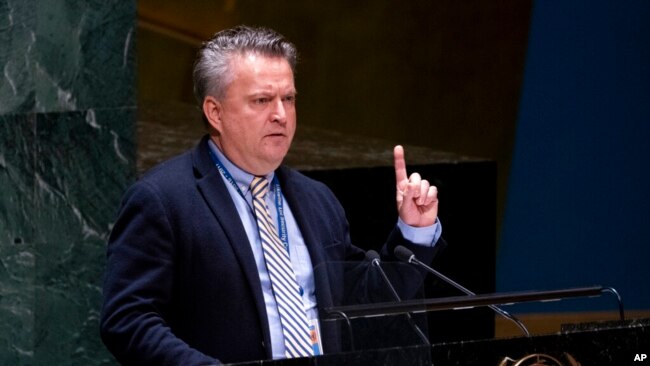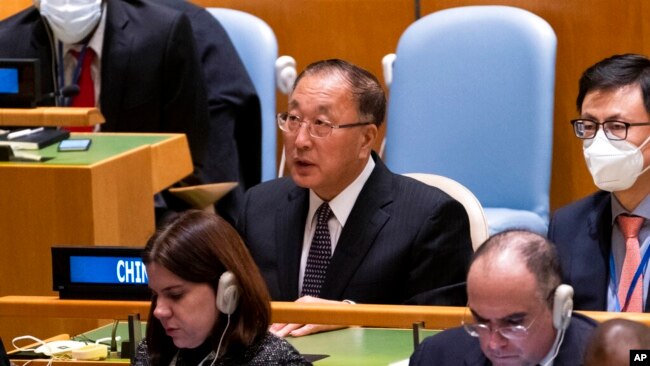The U.N. General Assembly voted Thursday to suspend Russia from the body’s Human Rights Council over atrocities it has been accused of committing in Ukraine.
In a vote of 93 to 24 with 58 abstentions, the assembly suspended Russia for its “gross and systematic violations of human rights” and violations of international law committed against Ukraine.
The resolution requires a two-thirds majority to be adopted; the abstentions are not counted.
“We view voting to suspend a state’s Human Rights Council rights as a rare and extraordinary action,” Ukrainian envoy Sergiy Kyslytsya said ahead of the vote.
“However, Russia’s actions are beyond the pale — Russia is not only committing human rights violations, it is shaking the underpinnings of international peace and security.”
Forty-seven countries are on the Geneva-based Human Rights Council. They are elected in secret ballot votes by the General Assembly. Russia is currently serving a three-year term that was due to expire on December 31, 2023.

Kyslytsya noted that April 7 is when the Rwandan genocide is commemorated, and said those massacres were due in large part to a lack of international action and failure by the United Nations to respond to warnings from the ground.
“On this day of grievances and bearing its own tragedy of thousands of Ukrainians killed by the Russian invaders, Ukraine stands together with Rwanda and calls to reaffirm our pledge to never forget and to never allow the recurrence of genocide, which was a result of the international community’s indifference,” the Ukrainian envoy said.
On Tuesday, Ukrainian President Volodymyr Zelenskyy admonished the U.N. Security Council in a video address for its inaction in stopping Russia’s war against his country. He called for Moscow to face accountability for crimes it has carried out there.
The United States led the move to suspend Russia and was joined by more than 60 countries in co-sponsoring the resolution.
“The country that’s perpetrating gross and systematic violations of human rights should not sit on a body whose job it is to protect those rights,” U.S. Secretary of State Antony Blinken told reporters in Brussels. “Today, a wrong was righted.”
“Unprecedented, historic vote,” U.S. Ambassador Linda Thomas-Greenfield told VOA after the vote. “We suspended a permanent member of the Security Council off of the U.N. Human Rights Council. We sent a strong message of support to the Ukrainians. We sent a strong message about human rights.”
She said the suspension is effective immediately.
Russian dismissals
Russia has repeatedly dismissed accusations of abuses and atrocities, saying they are either “fake news” or the Ukrainian side committed them to make them look bad.
Following the vote, Russia’s deputy U.N. ambassador, Gennady Kuzmin, said Moscow had taken its own decision to end its membership in the Human Rights Council and did not want to remain with Western states whom he accused of carrying out or abetting human rights abuses of their own.
“The sincere commitment of Russia to promoting and protecting of human rights does not make it possible for us to remain a member of an international mechanism that has become an enabler of the will of the above-mentioned group of countries,” Kuzmin said.
“You do not submit your resignation after you are fired,” Ukraine’s envoy told reporters in discussing Russia’s withdrawal.
This is only the second time the General Assembly has suspended a Human Rights Council member. It last happened in March 2011, when Libya was undergoing a brutal crackdown by then-dictator Moammar Gadhafi in a bid to suppress Arab Spring protests. He was ousted from power and later killed. Libya’s membership was restored eight months after its suspension, after a new government was installed.
Authority to investigate
The Human Rights Council has the authority to set up commissions of inquiry, fact-finding missions and investigations into rights abuses and has done so in many countries, including Syria, Myanmar and North Korea.
Last month, the council decided to establish an independent international commission of inquiry to investigate alleged violations and abuses in the context of Russia’s war against Ukraine. Three human rights experts have been appointed to collect and preserve evidence and testimony for any future legal proceedings.
Some countries that either voted against suspending Russia or abstained said they believed the move was premature and prejudges the outcomes of the commission of inquiry.

China, which had abstained in earlier assembly votes condemning Russia’s invasion and on the humanitarian consequences of the war, chose Thursday to side with Moscow and voted against the resolution.
“Such a hasty move at the General Assembly, which forces countries to choose sides, will aggravate the division among member states and intensify the contradictions between the parties concerned,” Ambassador Zhang Jun said. “It is like adding fuel to the fire, which is not conducive to the de-escalation of conflicts, and even less so to advancing the peace talks.”
Reluctance on suspension
Even some countries that have been vocal in condemning the war were not comfortable suspending Russia from the Human Rights Council, such as Mexico, which abstained.
“Yes, there is a commission of inquiry. We want to see the result of that commission of inquiry, but do we have to sit and continue to watch the carnage, watch the horror of Bucha happen over and over again, while Russia is sitting on the Human Rights Council?” Thomas-Greenfield told VOA.
Since its creation in 2006, the Human Rights Council has come in for frequent criticism because of the abhorrent rights records of some of its members. Currently, China, Eritrea, Pakistan and Venezuela are among its members.
The council has also been criticized for its focus on Israel. In 2018, the Trump administration left the body, calling it a “cesspool of political bias.” The Biden administration returned last year. Blinken said at the time that when the council works well, it shines a spotlight on countries with the worst human rights records./voa























































